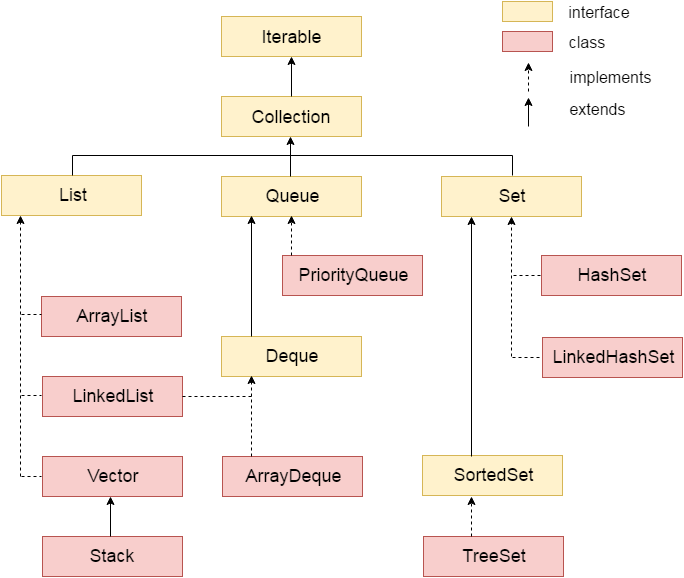Collections
Collections in java is a framework that provides an architecture to store and manipulate the group of objects.
All the operations that you perform on a data such as searching, sorting, insertion, manipulation, deletion etc. can be performed by Java Collections.
Java Collection simply means a single unit of objects. Java Collection framework provides many interfaces (Set, List, Queue, Deque etc.) and classes (ArrayList, Vector, LinkedList, PriorityQueue, HashSet, LinkedHashSet, TreeSet etc).

Contents
Methods of Collection interface
There are many methods declared in the Collection interface. They are as follows:
| No. | Method | Description |
|---|---|---|
| 1 | public boolean add(Object element) | is used to insert an element in this collection. |
| 2 | public boolean addAll(Collection c) | is used to insert the specified collection elements in the invoking collection. |
| 3 | public boolean remove(Object element) | is used to delete an element from this collection. |
| 4 | public boolean removeAll(Collection c) | is used to delete all the elements of specified collection from the invoking collection. |
| 5 | public boolean retainAll(Collection c) | is used to delete all the elements of invoking collection except the specified collection. |
| 6 | public int size() | return the total number of elements in the collection. |
| 7 | public void clear() | removes the total no of element from the collection. |
| 8 | public boolean contains(Object element) | is used to search an element. |
| 9 | public boolean containsAll(Collection c) | is used to search the specified collection in this collection. |
| 10 | public Iterator iterator() | returns an iterator. |
| 11 | public Object[] toArray() | converts collection into array. |
| 12 | public boolean isEmpty() | checks if collection is empty. |
| 13 | public boolean equals(Object element) | matches two collection. |
| 14 | public int hashCode() | returns the hashcode number for collection. |
Iterator interface
Iterator interface provides the facility of iterating the elements in forward direction only.
Methods of Iterator interface
There are only three methods in the Iterator interface. They are:
| No. | Method | Description |
|---|---|---|
| 1 | public boolean hasNext() | It returns true if iterator has more elements. |
| 2 | public Object next() | It returns the element and moves the cursor pointer to the next element. |
| 3 | public void remove() | It removes the last elements returned by the iterator. It is rarely used. |
Set
EnumSet
HashSet
LinkedHashSet
TreeSet
SortedSet
List
ArrayList
LinkedList
Vector
Stack
Queue
PriorityQueue
Deque
ArrayDeque
Map
HashMap
LinkedHashMap
IdentityHashMap
WeakHashMap
SortedMap
TreeMap
Generics
Collection Interview Questions and Answers
How HashMap works internally ?
HashMap works on the principle of Hashing. To understand Hashing , we should understand the three terms first
- Hash Function
- Hash Value
- Bucket
What is Hash function?
hashCode() method which returns an integer value is the Hash function. The important point to note that, this method is present in Object class.
This is the code for the hash function(also known as hashCode method) in Object Class :
public native int hashCode();What is Hash value?
HashCode method return an int value.So the Hash value is just that int value returned by the hash function.
What is bucket?
A bucket is used to store key value pairs. A bucket can have multiple key-value pairs. In hash map, bucket used is simply a linked list to store objects.
So how does hashMap works internally?
We know that Hash map works on the principle of hashing which means
HashMap get(Key k) method calls hashCode method on the key object and applies returned hashValue to its own static hash function to find a bucket location(backing array)
What if when two keys are same and have the same HashCode?
If key needs to be inserted and already inserted hashkey’s hashcodes are same, and keys are also same(via reference or using equals() method) then override the previous key value pair with the current key value pair. The other important point to note is that in Map ,Any class(String etc.) can serve as a key if and only if it overrides the equals() and hashCode() method.